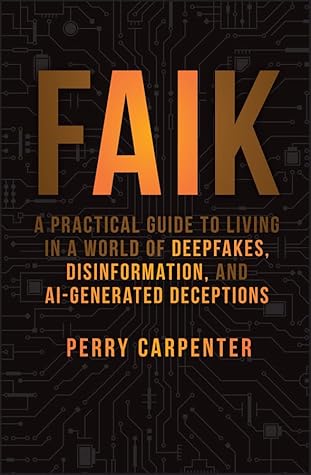Kindle Notes & Highlights
Read between
December 22, 2024 - January 21, 2025
Deception has been a part of the human story since the very beginning.
You’ll learn to critically evaluate media, verify sources, and fact check assertions. You’ll uncover the mental ploys used by those who seek to deceive, and—even more importantly—you’ll discover how to fortify your mind against them.
Technology molds to the hands and wills of those who wield it.
personal blind spots are.
I have an insatiable drive to understand what makes us tick and how we can be fooled, even when we think we know better.
If there is one thing fundamental to the human condition, it’s deception.
To be human is to deceive and be deceived.
The technology may change, but the fundamental tactics remain the same: exploit trust, leverage greed, and weaponize fear. The names and faces shift with the centuries, but the underlying game is as old as human nature.
cognitive security isn’t just a nice-to-have, it’s a must-have skillset for navigating the digital world with our autonomy and integrity intact.
Even LLMs with extremely large context windows can lose track of the overall context over very long passages.
LLM text generation is forward-only—there’s no backspace. At first, this might not seem significant, but consider this: if LLMs generate text by predicting the next word based on context, they can’t easily “fix” an answer that starts going off course.
These are challenges we must grapple with as a society. We’ll need new techniques for detecting and attributing fake content, new legal and ethical frameworks for governing the use of these technologies, and new forms of digital literacy and critical thinking to help us navigate a world in which seeing is no longer believing.
But the real magic is data…lots and lots of data. It’s the sheer amount of information the systems are trained on combined with the way that data is clustered. This creates tons of reinforced word associations and topic associations, resulting in scarily accurate predictions as to what a next token/word should be within a given context. But those predictions are built on rules and statistics rather than human-like reasoning.
The erosion of trust gives rise to something truly chilling: the Liar’s Dividend. This concept, coined by legal scholars Robert Chesney and Danielle Citron, refers to how the existence of highly realistic fake content provides plausible deniability to those caught engaging in genuine wrongdoing.
anyone accused of misdeeds can claim that the evidence against them is fake.
The Liar’s Dividend allows the guilty to hide among the innocent, using the public’s inability to distinguish truth from fiction as a smokescreen.
The result of all of this is that we need a societal shift in our relationship to media and information. We need to cultivate a new kind of digital literacy, one that emphasizes critical thinking, fact checking, and the ability to navigate a world in which the line between the real and the fake is increasingly blurred.
Yeah…asking an LLM to explain why it’s “thoughts” don’t really constitute thought is a very meta experience. You’re welcome.
As you might guess, one of the main reasons disinformation is so effective is that it often exploits our System 1 thinking. By provoking authority, urgency, outrage, fear, or other strong emotional responses, this content can short-circuit our rational thinking and lead us to share or act on false information.


